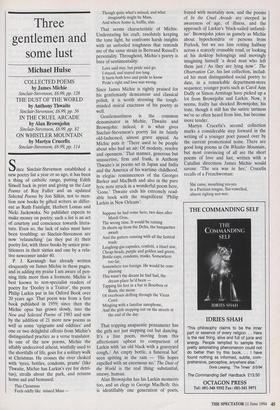Three gentlemen and some lust
Michael Hulse
COLLECTED POEMS by James Michie Sinclair-Stevenson, £6.99, pp. 128 Since Sinclair-Stevenson established a new poetry list a year or so ago, it has been a thing of catholic range, putting Edith Sitwell back in print and giving us the Last Poems of Roy Fuller and an updated Selected Poems by Jon Silkin, not to men- tion new books by gifted writers as differ- ent as Ruth Fainlight, Herbert Lomas and Nicki Jackowska. No publisher expects to make money on poetry; such a list is an act of courtesy and conscience towards litera- ture. Even so, the lack of sales must have been troubling: so Sinclair-Stevenson are now 'relaunching' (as they put it) their poetry list, with three books by senior prac- titioners in their sixties and one by a rela- tive newcomer under 40.
P. J. Kavanagh has already written eloquently on James Michie in these pages, and in adding my praise I am aware of pen- ning little more than a footnote. Michie is best known to non-specialist readers of poetry for 'Dooley is a Traitor', the poem Philip Larkin put in his Oxford Book over 20 years ago. That poem was from a first book published in 1959; since then the Michie opus has grown slowly, into the New and Selected Poems of 1983 and now by the addition of 21 more new poems as well as some 'epigrams and oddities' and one or two delightful offcuts from Michie's distinguished practice as a verse translator. In one of the new poems, Michie the affably undeceived atheist, wistfully used to the shortfalls of life, goes for a solitary walk at Christmas. He crosses the river choked with 'tyres, bottles, condoms, prams' (like Thwaite, Michie has Larkin's eye for detri- tus); strolls about the park, and returns home sad and bemused:
This Christmas Feels oddly like missed Mass — Though quite what's missed, and what imaginably might be Mass, And where home is, baffle, alas.
That seems characteristic of Michie. Understating his craft, resolutely keeping the tone light, he confronts harsh insights with an unfooled toughness that reminds me of the same strain in Bertrand Russell's personality. Throughout, Michie's poetry is bare of sentimentality:
Love said stay, but pride said go.
I stayed, and stayed too long.
It hurts both love and pride to know Pride's right and love was wrong.
Since James Michie is rightly praised for his gentlemanly demeanour and classical polish, it is worth stressing the tough- minded stoical exactness of his poetry as well.
Gentlemanliness is the common denominator in Michie, Thwaite and Brownjohn: indeed, it is what gives Sinclair-Stevenson's poetry list its faintly old-fashioned, almost grave appeal. As Michie puts it: 'There used to be people about who had an air/ Of modesty, resolve and openness.' That manner, generous but unassertive, firm and frank, is Anthony Thwaite's in poems set in Japan and India and the America of his wartime childhood, in elegiac reminiscences of the Georges Barker and MacBeth and also in the pure lyric note struck in a wonderful poem here, 'Gone.' Thwaite ends his extremely read- able book with the magnificent 'Philip Larkin in New Orleans':
Suppose he had come here, two days after Mardi Gras, The wrong time. It would be raining In sheets up from the Delta, the banquettes awash And the gutters running with all the festival trash: Laughing-gas capsules, confetti, a tinsel star, Cheap beads, purple and golden and green, Bottle-caps, condoms, masks. Somewhere too far, Somewhere too foreign. He would be com- plaining This wasn't the dream he had had, the dream-place he'd been - Tapping his feet in a bar in Bourbon or Basin, the moan Of riverboats drifting through the Vieux Cane Mingling with a familiar saxophone, And the girls stepping out on the streets at the end of the day.
That tripping anapaestic pentameter has the girls not just stepping out but dancing. It's a fine poem, moving from this affectionate upbeat to comparison of Larkin with 'an old black with a graveyard cough,/ An empty bottle, a funereal hat' seen spitting in the rain — 'His hopes expelled with an enormous no.' The Dust of the World is the real thing: substantial, sinewy, human.
Alan Brownjohn has his Larkin moments too, and an elegy to George MacBeth: this is identifiably one generation of poets, frayed with mortality now, and the poems of In the Cruel Arcade are steeped in awareness of age, of illness, and the approach of Larkin's 'black-sailed unfamil- iar'. Brownjohn jokes as gamely as Michie about hypochondria or persons from Porlock, but we see him resting halfway across a scarcely crossable road, or looking at his desktop belongings and , movingly imagining himself 'a dead man who left them just / As they are lying now '. The Observation Car, his last collection, includ- ed his most distinguished social poetry to date, in a remarkable department-store sequence; younger poets such as Carol Ann Duffy or Simon Armitage have picked up a lot from Brownjohn and Larkin. Now, it seems, frailty has shocked Brownjohn; his tone, though it still has the satiric tartness we've so often heard from him, has become more tender.
Martyn Crucefix's second collection marks a considerable step forward in the writing of a younger poet passed over by the current promotional noise. There are good long poems in On Whistler Mountain, but most convincing of all are the short poems of love and lust, written with a Catullan directness James Michie would savour. 'The sea was in her,' Crucefix recalls of a Frenchwoman:
She came, mouthing yes-yes in a Parisian tongue, flat-vowelled, almost sighing wet-wet.


































































 Previous page
Previous page